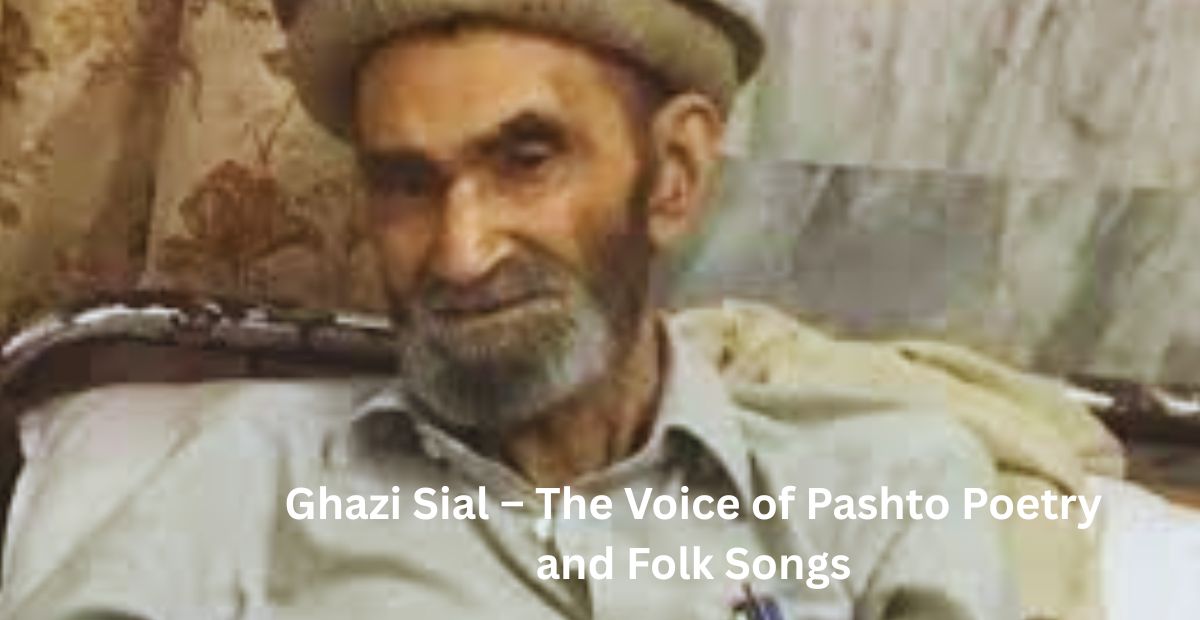Published on April 30, 2025 | By [Your Name]
Pashto literature has been blessed with many towering figures, but few have left an impact as profound and lasting as Mohammad Ghazi, more famously known by his pen name Ghazi Sial. Revered by many as Baba Sandara—an honorific title in Pashto literature—he was a master poet, prolific songwriter, and a cultural icon whose contributions shaped the modern landscape of Pashto folk music and poetry.
Early Life and Background
Born in 1933 in Kotka Akundan village, nestled in the Bannu District of Khyber Pakhtunkhwa, Ghazi Sial was raised in a household rich with literary tradition. His father, Abdul Ghafoor Shah, was both a literary figure and a respected religious scholar. Under his father’s guidance, young Ghazi immersed himself in the classical texts of Pashto, Arabic, and Persian—a foundation that deeply influenced his poetic voice in the years to come.
A Literary Journey Rooted in Tradition
Ghazi Sial began composing Pashto folk songs in his teenage years, a passion that would evolve into a lifelong mission. He later joined Radio Pakistan in Peshawar, where he dedicated 30 years of service, writing and promoting Pashto folk songs. His contributions not only kept traditional Pashto music alive but also introduced it to newer generations.
Published Works and Creative Legacy
Over the course of his illustrious career, Ghazi Sial authored sixteen books in the Pashto language. Among his most acclaimed poetic works are:
- Banzey
- Kashmala
- Mangarai
- Zama Sandaray Sta Da Para
These collections showcase his mastery over language, emotion, and the unique rhythm of Pashto verse.
His poetic creations were not limited to the written word. His folk songs were brought to life by iconic Pashto singers such as Zarsanga, Gulnar Begum, and Kishwar Sultana. These collaborations made his work household staples in Pashtun communities across Pakistan and Afghanistan.
Contributions to Pashto Cinema
In addition to poetry and music, Ghazi Sial made significant strides in Pashto cinema, contributing to the industry by writing scripts, storylines, and dialogues for nearly 50 Pashto films. His narratives added depth and authenticity to the silver screen, making him a well-respected figure in both literary and cinematic circles.
National Recognition
His exceptional work did not go unnoticed. In 2006, the Government of Pakistan awarded him the Pride of Performance, one of the highest civil awards in the country, recognizing his invaluable contribution to Pashto poetry and folk culture.
A Legacy Remembered
Ghazi Sial passed away on 27 November 2019, leaving behind a rich legacy that continues to inspire poets, musicians, and cultural enthusiasts. His influence spans across borders, with literary communities in both Pakistan and Afghanistan honoring his memory and celebrating his work.
Conclusion
Ghazi Sial was not just a poet—he was a storyteller, a cultural preserver, and a bridge between tradition and modernity. His voice, though silenced, echoes through his songs, poems, and films. For anyone exploring the soul of Pashto literature and folklore, the works of Ghazi Sial are an essential and enriching experience.
Keywords: Ghazi Sial, Mohammad Ghazi poet, Pashto poetry, Pashto folk songs, Bannu poet, Baba Sandara, Pride of Performance, Pashto literature, Pashto cinema, Zarsanga songs
Would you like me to design a featured image or social media snippet for this article?
